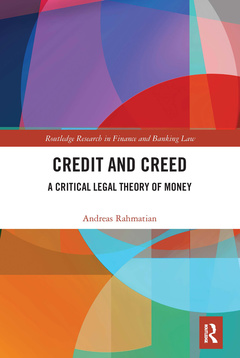Description
Credit and Creed
A Critical Legal Theory of Money
Routledge Research in Finance and Banking Law Series
Language: English
Subjects for Credit and Creed:
Keywords
Young Man; Double Entry Bookkeeping; economists; Double Entry; economics; Central Bank Money; legal concept; Bank Money; medium of exchange; Southern EU Country; transaction; EU Legal System; Dynamic; Legal Res; Static; Money Creation Process; theory of money; Commercial Bank Money; commercial banks; Quantity Equation; bitcoin; Classical Quantity Theory; cryptocurrency; Fractional Reserve System; digital currency; Transfer Cycle; e-money; Loan Sum; debtor; Sovereign Money; creditor; Real Commodity; dematerialised property; EU Law; monetary system; Electronic Money; Fintech; Bank Money Creation; debtor's viewpoint; Supply Demand Model; creditor's perspective; Client Money; money supply process; Fractional Reserve; legal theory of money; ESM Treaty
Publication date: 12-2021
· 15.6x23.4 cm · Paperback
Publication date: 11-2019
· 15.6x23.4 cm · Hardback
Description
/li>Contents
/li>Readership
/li>Biography
/li>
Money is a legal institution with principal economic and sociological consequences. Money is a debt, because that is how it is conceptualised and comes into existence: as circulating credit ? if viewed from the creditor?s perspective ? or, from the debtor?s viewpoint, as debt. This book presents a legal theory of money, based on the concept of dematerialised property. It describes the money creation or money supply process for cash and for bank money, and looks at modern forms of money, such as cryptocurrencies. It also shows why mainstream economics presupposes, but avoids an analysis of, money by effectively eliminating money from the microeconomic market model and declaring it as merely a neutral medium of exchange and unit of account. The book explains that money rather brings about and influences substantially the exchange or transaction it is supposed to facilitate only as a neutral medium. As the most liquid of all assets, money enables financialisation, monetisation and commodification in the economy. The central role of the banks in the money creation process and in the economy, and their strengthened position after the bank rescue measures in the wake of the financial crisis 2008-9 are also discussed.
Providing a rigorous analysis of the most salient legal issues regarding money, this book will appeal to legal theorists, economists and anyone working in commercial or banking law.
1. The Legal Concept of Money; 2. The Creation of Money and its Legal Basis; 3. Money as a Static Concept: Money in Economics; 4. A Dynamic Concept of Money. The Alienation Cycle; 5. The Legal Underpinnings for the Functioning of Money as Money: The Faith in Money and the Power of the Banks; 6. Conclusion; 7. Bibliography; 8. Index
Andreas Rahmatian is Professor of Commercial Law at the University of Glasgow. His research interests are in intellectual property and commercial law, property theory, comparative law and legal theory, and intellectual history and the law.




